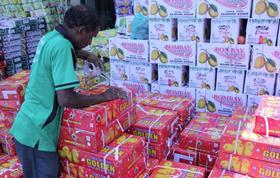
According to a report released 25 April by the University of Birmingham, the need for more cooling services across India’s food production sector is complicated by a warming climate and environmental concerns over refrigerants.
The University said that around 50 per cent of the country’s food is lost post-harvest due to a lack of cooling, but this could be curbed by effective use of smartphone technology, which has penetrated India’s rural regions.
The report said harnessing smartphone technology so that Indian farmers make better business decisions could help to tackle the sustainable cooling challenge facing India, as well as the rest of the world.
It recommended using mobile apps and data analysis to manage harvesting and logistics to help reduce the amount of food wasted between farm gate and supermarket shelf. This would boost farmers’ incomes and reduce the environmental impact of much-needed food cooling.
“The way forward is for India is transition to cleaner and more efficient cold chains, in order to tackle climate change and to achieve wider socioeconomic benefits,” said Krishan Dhawan, CEO at the Shakti Sustainable Energy Foundation.
According to Asish Puri, of Avalon Consulting, India currently possesses only around 11 per cent of the total cold storage capacity demanded by the country’s perishable produce industry.



